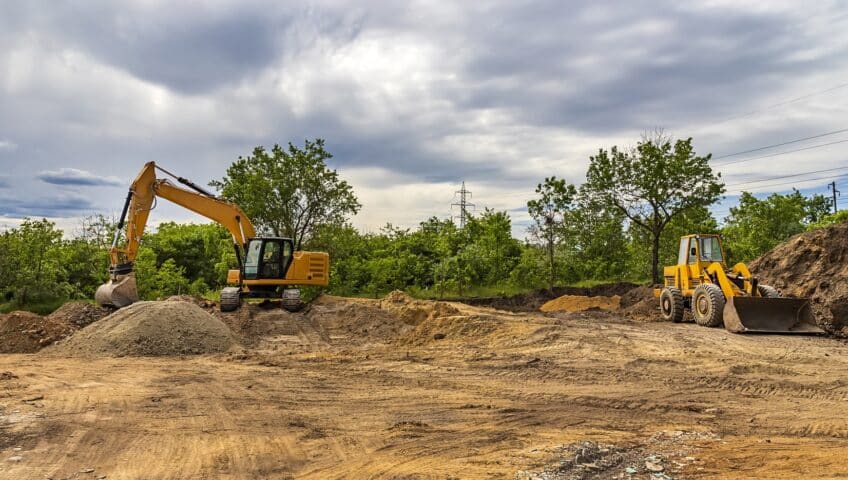Site grading is an integral part of construction and landscaping processes that involves shaping and levelling the ground to create a stable foundation for structures and drainage systems. Traditional site grading methods can often have a negative impact on the environment, causing soil erosion, compacting natural habitats, and altering the natural landscape. In response to this, eco-friendly site grading techniques have emerged as a more sustainable solution that prioritises the protection of both your landscape and the environment.
New Wave Earth Works is dedicated to implementing eco-friendly practices in all aspects of landscaping and construction, including site grading. In this article, we will share some of the most effective environmentally friendly site grading techniques that can be employed to minimise ecological disruption, protect your landscape, and create a sustainable foundation for future development. Join us as we explore the greener side of site grading and reveal methods for achieving beautiful landscapes while preserving the planet.
1. Preventing Soil Erosion during Site Grading
Soil erosion is one of the most significant environmental concerns associated with traditional site grading methods. The excessive removal of vegetation and aggressive earthmoving practices can leave the ground vulnerable to erosion from wind and water. To combat this issue, eco-friendly site grading techniques employed in Mission focus on preserving natural vegetation and employing erosion control measures:
– Limiting site clearing: Clearing only the vegetation and trees necessary for the construction project helps retain the soil structure and reduces the potential for erosion.
– Preserving topsoil: Proper storage and later redistribution of topsoil aids in the establishment of new vegetation, accelerating the site’s recovery post-construction.
– Utilising erosion control barriers: Temporary barriers, such as silt fences, straw wattles, and filter socks, can be strategically positioned to reduce water velocity and prevent soil from washing away during grading activities.
2. Minimising Disturbance to Natural Habitats and Hydrology
Traditional grading often results in significant alterations to the landscape, impacting natural habitats and water drainage patterns. Sustainable site grading techniques aim to minimise these disturbances and preserve the existing natural features of a site in Mission:
– Implementing wildlife-friendly designs: Eco-friendly site grading incorporates buffer zones around environmentally sensitive areas, such as wetlands, streams, and nesting sites, to preserve natural habitats for local wildlife.
– Respecting natural drainage: Aligning grading plans with the existing water movement patterns of a site, maintaining natural catchments, swales, and drainage pathways, helps to avoid creating drainage issues and subsequent ecological disruptions.
– Limiting impervious surfaces: Incorporating porous materials, such as permeable pavements and retained vegetative cover in graded site plans, reduces stormwater runoff and promotes infiltration, ultimately preserving the site’s hydrological balance.
3. Enhancing Natural Beauty through Landscape-Efficient Grading
Eco-friendly site grading techniques prioritise the preservation and enhancement of a site’s natural beauty, ensuring continuity with the surrounding landscape and contributing to a pleasing environment:
– Gentle grading: Gradual slope modifications, rather than abrupt levelling or over excavation, preserve the natural topography, preventing unnecessary disturbance and maintaining the existing landforms’ integrity.
– Terracing steep slopes: On steeply sloped sites, terracing with purpose-built retaining walls can help establish stable construction platforms and control erosion while preserving natural contours.
– Native vegetation and habitat restoration: Re-vegetating graded areas with native plants post-construction supports ecological recovery and promotes biodiversity, enabling the newly graded land to blend seamlessly with the surrounding environment.
4. Employing Environmentally Friendly Machinery and Practices
The use of energy-efficient machinery and sustainable construction practices can significantly reduce the environmental impact of site grading operations in Mission:
– Selecting low-emission equipment: Opting for fuel-efficient, low-emission grading machinery, such as hybrid or electric excavators, reduces greenhouse gas emissions, and lowers energy consumption.
– Adhering to best management practices (BMPs): Implementing erosion and sediment control BMPs during construction and grading activities minimises adverse impacts on both air and water quality, protecting the local environment.
– Preventing soil compaction: Employing practices such as low ground pressure equipment, tracking mats, or limiting heavy machinery traffic to designated areas helps to avoid soil compaction, which can stifle vegetation growth and cause poor drainage.
5. Site Grading Efficiency through Construction Staging and Collaboration
Efficient and well-coordinated grading operations lessen the environmental impact by reducing construction timelines, minimising disruptions to the landscape, and contributing to a smoother development process:
– Streamlining project phases: Employing a phased construction approach that minimises the time between site disturbance and completion can help to reduce the overall environmental impact of grading activities.
– Coordinating with adjacent landowners: Collaborative site development planning, particularly in areas where multiple adjacent properties are undergoing grading, can minimise disruptions to natural habitats, streamline resource use, and maximise efficiency.
– Integrating site grading with other construction activities: Coordinating site grading with other construction processes, such as utility installation and building construction, can reduce the overall development timeline and minimise both human and environmental disturbance.
Embrace Eco-Friendly Grading with New Wave Earth Works
Successfully protecting your landscape while pursuing construction and landscaping projects is achievable through the use of eco-friendly site grading techniques. New Wave Earth Works is devoted to implementing environmentally conscious practices that align with such principles to ensure long-lasting, sustainable outcomes for your project. Our expert team provides the knowledge, experience, and commitment to sustainable solutions that prioritise the well-being of our natural environment in Mission and beyond.
If you are planning a project that demands site grading, consider partnering with New Wave Earth Works for eco-friendly, landscape-preserving site grading solutions. We work with you to understand your vision and ensure the best possible results for your project while minimising environmental impact. Contact us today to learn more about our eco-friendly practices and how we can help you protect your landscape and achieve the sustainable development you desire.


